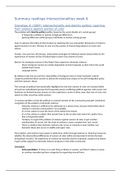Summary readings intersectionalities week 6
Crenshaw, K. (1997). Intersectionality and identity politics: Learning
from violence against women of color
The problem with identity politics (politics based on the social identity of a certain group)
- It frequently conflates or ignores intragroup differences.
- Ignoring difference within groups contributes to tension among groups
Goal: to advance the telling of that location by exploring the race and gender dimensions of violence
against women of color. Women of color are the product of intersecting patterns of racism and
sexism.
Gender, class and race all intersect. Intervention strategies for battered women based solely on the
experiences of women will be of limited help to lower class women of color.
Barriers for immigrant women to find help if they experience domestic violence:
- Many immigrant women are wholly dependent on their husbands as their link to the world
outside their homes
- Language barrier
By failing to take into account the vulnerability of immigrant wives to their husbands’ control,
Congress positioned these women to absorb the simultaneous impact of its anti-immigration policy
and their spouses’ abuse.
The concept of political intersectionality highlights the fact that women of color are situated within
at least two subordinated groups that frequently pursue conflicting political agendas. Anti-racism and
feminism are limited because women of color experience racism in other ways than men of color and
sexism in other ways than white women.
A common problem is that the political or cultural interests of the community precludes (uitsluiten)
recognition of the problem of domestic violence:
- Domestic violence is unlikely to be addressed as a serious issue, because information about
violence in minority communities is not available.
- It’s in the culture to save the honor of the family from shame
- It’s in the culture to subject their private lives to the scrutiny and control of a police force
that is frequently hostile
- Tendency to regard the problem of violence against women of color as just another
manifestation of racism. But the chain of violence is more complex than ‘just racism’.
- There is a believe that domestic violence only occurs in minority or poor families, but
domestic abuse also occurs in middle and upper class.
The problem: anti-violence have power to determine, either through material or rhetorical resources,
whether the intersectional differences of women of color will be incorporated at all into the basic
formulation of policy. The experience of violence by minority women is ignored, except to the extent
it gains white support for domestic violence programs in the white community.
Conclusion
- Anti-essentialism there is no such thing as blacks or women, and thus it makes no sense
to continue reproducing those categories by organizing around them.
, - The process of categorizing is not unilateral. Subordinated people can and do participate,
sometimes even subverting the naming process in empowering ways.
- Two types of power in identity politics: 1) the power exercised simply through the process of
categorization and 2) the power to cause that categorization to have social and material
consequences.
- When identity politics fail us, it is because the descriptive content of those categories and the
narratives on which they are based have privileged some experiences and excluded others.
- Intersectionality provides a basis for reconceptualizing race as a coalition between men and
women of color. With identity thus reconceptualized, it may be easier to understand the
need for and to summon the courage to challenge groups that are after all home to us, in the
name of the parts of us that are not made at home.
- Recognizing that identity politics takes place at the site where categories intersect thus
seems more fruitful than challenging the possibility of talking about categories at all. Through
an awareness of intersectionality, we can better acknowledge and ground the differences
among us and negotiate the means by which these differences will find expression in
constructing group politics.
Collins, P. (2015). Intersectionality’s definitional dilemmas
The term intersectionality references the critical insight that race, class, gender, sexuality, ethnicity,
nation, ability, and age operate not as unitary, mutually exclusive entities, but as reciprocally
constructing phenomena that in turn shape complex social inequalities.
Goal: to provide navigational tools for thinking about intersectionality rather than coverage of
intersectionality writ large.
Racial formation theory, knowledge projects, and intersectionality
Intersectionality faces a particular definitional dilemma. It participates in the very power relations
that it examines and, as a result, must pay special attention to the conditions that make its
knowledge claims comprehensible.
What kinds of racial projects appear and disappear across specific racial formations and why. Just as
racial formations change in response to racial projects, racial projects change in relation to changing
racial formations.
Benefit of racial formation theory: it can account for change in ways that retain the agency of
individual human actors and group-based action.
Racial formation theory offers social actors guidance as to how their individual and collective actions
matter in shaping racial inequality. Intersectionality can build on this theory by moving beyond a
mono-categorical focus on racial inequality to encompass multiple forms of inequality that are
organized via a similar logic. Intersectionality is an overarching knowledge project. It focusses on
three interdependent concerns:
1. Intersectionality is the object of investigation
2. It is an analytical strategy
3. It is a form of critical praxis, especially its connections with social justice
Traveling light? Intersectionality as a field of study
Intersectionality’s rapid growth and acceptance come with benefits and challenges:
- Benefit: it fostered a dynamism that has encouraged creativity within and across academic
disciplines
Crenshaw, K. (1997). Intersectionality and identity politics: Learning
from violence against women of color
The problem with identity politics (politics based on the social identity of a certain group)
- It frequently conflates or ignores intragroup differences.
- Ignoring difference within groups contributes to tension among groups
Goal: to advance the telling of that location by exploring the race and gender dimensions of violence
against women of color. Women of color are the product of intersecting patterns of racism and
sexism.
Gender, class and race all intersect. Intervention strategies for battered women based solely on the
experiences of women will be of limited help to lower class women of color.
Barriers for immigrant women to find help if they experience domestic violence:
- Many immigrant women are wholly dependent on their husbands as their link to the world
outside their homes
- Language barrier
By failing to take into account the vulnerability of immigrant wives to their husbands’ control,
Congress positioned these women to absorb the simultaneous impact of its anti-immigration policy
and their spouses’ abuse.
The concept of political intersectionality highlights the fact that women of color are situated within
at least two subordinated groups that frequently pursue conflicting political agendas. Anti-racism and
feminism are limited because women of color experience racism in other ways than men of color and
sexism in other ways than white women.
A common problem is that the political or cultural interests of the community precludes (uitsluiten)
recognition of the problem of domestic violence:
- Domestic violence is unlikely to be addressed as a serious issue, because information about
violence in minority communities is not available.
- It’s in the culture to save the honor of the family from shame
- It’s in the culture to subject their private lives to the scrutiny and control of a police force
that is frequently hostile
- Tendency to regard the problem of violence against women of color as just another
manifestation of racism. But the chain of violence is more complex than ‘just racism’.
- There is a believe that domestic violence only occurs in minority or poor families, but
domestic abuse also occurs in middle and upper class.
The problem: anti-violence have power to determine, either through material or rhetorical resources,
whether the intersectional differences of women of color will be incorporated at all into the basic
formulation of policy. The experience of violence by minority women is ignored, except to the extent
it gains white support for domestic violence programs in the white community.
Conclusion
- Anti-essentialism there is no such thing as blacks or women, and thus it makes no sense
to continue reproducing those categories by organizing around them.
, - The process of categorizing is not unilateral. Subordinated people can and do participate,
sometimes even subverting the naming process in empowering ways.
- Two types of power in identity politics: 1) the power exercised simply through the process of
categorization and 2) the power to cause that categorization to have social and material
consequences.
- When identity politics fail us, it is because the descriptive content of those categories and the
narratives on which they are based have privileged some experiences and excluded others.
- Intersectionality provides a basis for reconceptualizing race as a coalition between men and
women of color. With identity thus reconceptualized, it may be easier to understand the
need for and to summon the courage to challenge groups that are after all home to us, in the
name of the parts of us that are not made at home.
- Recognizing that identity politics takes place at the site where categories intersect thus
seems more fruitful than challenging the possibility of talking about categories at all. Through
an awareness of intersectionality, we can better acknowledge and ground the differences
among us and negotiate the means by which these differences will find expression in
constructing group politics.
Collins, P. (2015). Intersectionality’s definitional dilemmas
The term intersectionality references the critical insight that race, class, gender, sexuality, ethnicity,
nation, ability, and age operate not as unitary, mutually exclusive entities, but as reciprocally
constructing phenomena that in turn shape complex social inequalities.
Goal: to provide navigational tools for thinking about intersectionality rather than coverage of
intersectionality writ large.
Racial formation theory, knowledge projects, and intersectionality
Intersectionality faces a particular definitional dilemma. It participates in the very power relations
that it examines and, as a result, must pay special attention to the conditions that make its
knowledge claims comprehensible.
What kinds of racial projects appear and disappear across specific racial formations and why. Just as
racial formations change in response to racial projects, racial projects change in relation to changing
racial formations.
Benefit of racial formation theory: it can account for change in ways that retain the agency of
individual human actors and group-based action.
Racial formation theory offers social actors guidance as to how their individual and collective actions
matter in shaping racial inequality. Intersectionality can build on this theory by moving beyond a
mono-categorical focus on racial inequality to encompass multiple forms of inequality that are
organized via a similar logic. Intersectionality is an overarching knowledge project. It focusses on
three interdependent concerns:
1. Intersectionality is the object of investigation
2. It is an analytical strategy
3. It is a form of critical praxis, especially its connections with social justice
Traveling light? Intersectionality as a field of study
Intersectionality’s rapid growth and acceptance come with benefits and challenges:
- Benefit: it fostered a dynamism that has encouraged creativity within and across academic
disciplines





